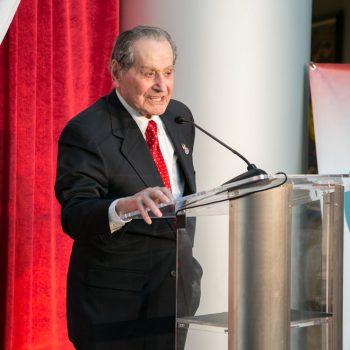World War II veteran Col. Arnald D. Gabriel, 94, had somewhere very important to be on December 7, 2016. A combat machine gunner with the United States Army’s famed 29th Infantry Division and Conductor Emeritus of the U.S. Air Force Band Symphony Orchestra, Col. Gabriel was due in Hawaii to conduct three separate musical events for the 75th anniversary ceremony commemorating the attack on Pearl Harbor.
Col. Gabriel’s career included being Commander/Conductor of the Air Force Orchestra. He is known worldwide for his innovative musical leadership and genius.
A few months before the anniversary, Col. Gabriel, who lives in Alexandria, VA, was feeling unusually fatigued. His cardiologist recommended Inova, where he discovered he has severe aortic stenosis and needed a new aortic valve. Heart surgery, thought Gabriel, sounded serious and scary, and worse, it meant he might miss the milestone anniversary. “There was no way I was going to miss that,” says the colonel.
Meanwhile, his doctors decided he was a perfect candidate for the minimally invasive transcatheter aortic valve replacement (TAVR) as an alternative to traditional open heart surgery. With TAVR a surgeon uses a catheter to implant a bioprosthetic device within the original aortic valve. In Col. Gabriel’s case, the valve was inserted through an artery in his groin. “I was so surprised they could do that,” says Col. Gabriel. “It was like going into the auto shop and having spark plugs replaced.”
“Col. Gabriel had some risk factors that made him a good candidate for a less invasive procedure,” says Dr. Matthew Sherwood, an Inova interventional cardiologist who worked on the case. “Plus, he wanted to get back to the things he enjoys.” Open heart surgery usually entails a five to seven day hospital stay and then potentially an extended stay in rehab, “where you don’t feel normal at all,” says Dr. Sherwood. “But I tell my TAVR patients you’ll be up and walking the next day and recovered in a week or two. They get back to their lives in a much fuller sense and much more quickly,” Dr. Sherwood explains.
Sure enough, Col. Gabriel was released from the hospital just a couple of days after the procedure. He recovered comfortably at home with the help of his five children, then headed for Hawaii with much more energy than he had before the TAVR. These days, he shows little sign of slowing down. He travelled to an important musical event in Florida last January then conducted three or four concerts in March. He’s also busy promoting his recently released biography, The Force of Destiny: The Life and Times of Arnald D. Gabriel, written by his son, Michael A. Gabriel.
“I’m very pleased with the whole operation,” says Col. Gabriel. “I have more energy than before and I plan to do 20 gigs this year. If I hadn’t done it, I wouldn’t have much more of a lifespan. Everyone at Inova is just wonderful.”

